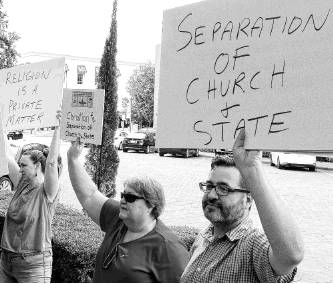ANOTHER VIEW
Don’t turn my church into a PAC
By Garrett Vickrey FOR THE EXPRESS-NEWS
Once again, the Johnson Amendment — a federal law that protects our charitable sector, including houses of worship, from candidates seeking endorsements during political campaigns — is up for debate. Once again you can hear people of faith across America turning into a united chorus saying, “Don’t turn my congregation into a political action committee!”
Supporting the Johnson Amendment seems to be one of the few things capable of bringing together people of faith from across the theological spectrum.
In April, 99 national and state religious bodies joined together to tell Congress that they do not need or want a change in the law to pursue their religious mission.
In August, over 4,000 faith leaders sent a letter to Congress asking to keep the current law.
A LifeWay research poll from 2016 reports 79 percent of Americans say it is inappropriate for pastors to publicly endorse political candidates.
People from across the conservative to liberal spectrum seem to understand that the Johnson Amendment is a good thing because it keeps churches from being overly involved in partisan politics.
In six years as a pastor in San Antonio, I have never had anyone in my church ask me who they should vote for.
Getting rid of the Johnson Amendment would incentivize candidates and partisan groups to use congregations for partisan campaign activities. Houses of worship could be turned into virtual political action committees, providing an irresistible loophole for some to count campaign contributions as tax deductions by funneling them through houses of worship.
The Johnson Amendment protects the integrity of houses of worship. It does that by shielding congregations from being targeted by political campaigns. It does not target churches or pastors to limit their free speech.
This critical tax law protects churches from the lustful temptation of partisan politics. In our drive to create our own vision of the Kingdom of Heaven here on Earth, we have at times forgotten to follow what Jesus claimed were the greatest commandments — loving God and loving our neighbor.
In our fervor to create our own heaven on Earth, we in the church have too often claimed that the ends justify the means. Through this terrible theology terrible things happen.
If you do not think that faithful Christians would take advantage of the system for political gain, then you do not know your history very well.
While most religious leaders support the Johnson Amendment, a minority longs for political power and yearns to elevate their theology to state policy. They are itching to get rid of the Johnson Amendment as a means of diving head first into electoral politics.
Imagine a scenario where churches across the country function as political action committees for candidates. A big steeple pastor in the city calls a colleague in a small town, “We have someone who wants to give some money, but you know, we’ve already given a bunch of money to this one candidate. Maybe you could accept this donation and then send it on to this fine Christian running for Congress.”
We need the Johnson Amendment. And by “we” I mean churches need the Johnson Amendment. We need it to keep us honest. We need it because we have the responsibility, as Martin Luther King Jr. said, to be “the conscience of the state.”
It may not look like we are living up to that high calling. But there are churches across this country doing incredible work. We do not need this complicating or muddying the waters of the Gospel.
Our own history has done that enough.
Garrett Vickrey is the pastor of Woodland Baptist Church in San Antonio.

